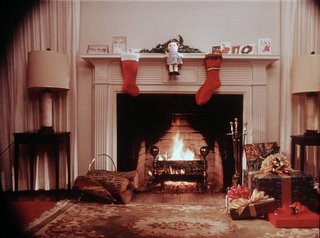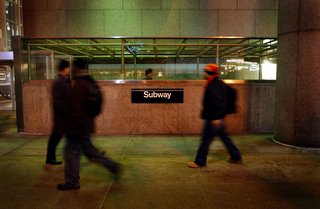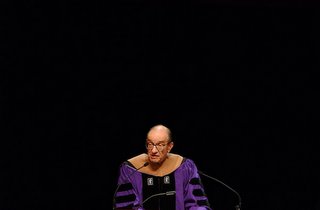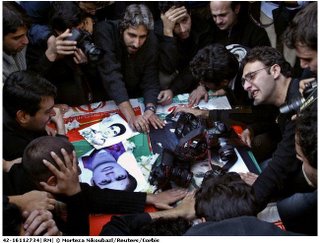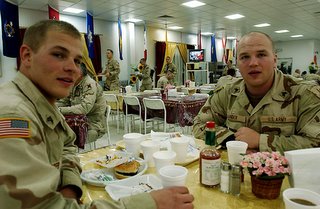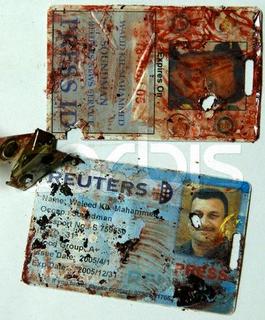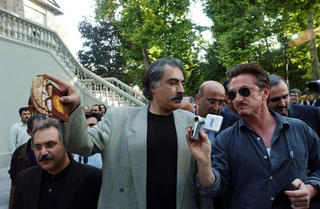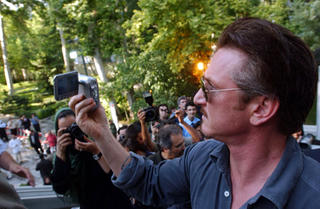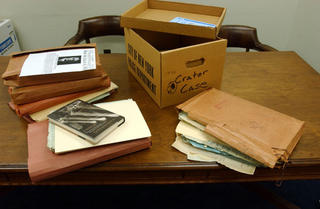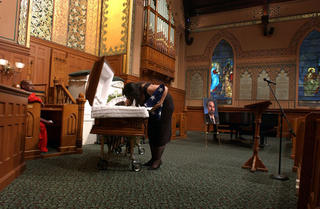Saturday, December 31, 2005
2005, a Perspectives in Quotes
KATRINA
"What I'm hearing which is sort of scary, is they all want to stay in Texas. Everyone is so overwhelmed by the hospitality. And so many of the people in the arena here, you know, were underprivileged anyway, so this is working very well for them."
Former First Lady Barbara Bush, on hurricane refugees in the Houston Astrodome.
JUST WRONG
"I got it at Nordsstroms [sic] ... Are you proud of me? Can I quit now? Can I go home?"
Former FEMA Director, Michael Brown, in an Aug. 29 2005, email to an aid about his TV appearance and wardrobe.
"It's got everything. Fame. Race. Homosexuality. A Peter Pan love story."
British paparazzo Jeff Rayner, explaining the media's interest in the Michael Jackson child molestation story.
JUST RIGHT
"This is killing us around the world."
Sen. John McCain (R-AZ) to VP Dick Cheney, after asking the GOP senators to reconsider the anti-torture amendment.
IRAQ
"It is true that much of the intelligence turned out to be wrong. As president, I'm responsible for the decision to go into Iraq."
President Bush, offering a mea culpa but strongly defending his decision to go to war, on the eve of Iraq's first national election.
"I chose to do what my friends wanted me to."
Pfc. Lynndie England, pleading guilty at her court-martial on charges of prisoner abuse in Abu Ghraib.
"He's said that my son - and other children we've lost - died for a noble cause. I want to find out what the noble cause is."
Cindy Sheehan, whose son Casey died in Iraq, on why she was keeping a vigil outside Geroge Bush's ranch in Crawford, Texas.
TERRORISIM
"If London can survive the Blitz, it can survive four miserable events like this."
Sir Ian Blair, London Metropolitan Police commissioner on London transit bombings.
CORP. AMERICA
"You did not notice $25 million was missing from your W-2?"
Prosecutor, Ann Donnelly, to former Tyco CEO, Dennis Kozlowski at his trial for securities fraud.
FINAL WORD
"Courage."
TV anchor, Dan Rather, final word as he signed off from the CBS Evening News" for the last time after 24 years of reporting. Rather was mocked for using the signoff when he experimented with it briefly in 1986.
source: Newsweek
Ramin Talaie
December 31, 2005
Brooklyn, New York
2005, a Perspectives in Quotes
KATRINA
"What I'm hearing which is sort of scary, is they all want to stay in Texas. Everyone is so overwhelmed by the hospitality. And so many of the people in the arena here, you know, were underprivileged anyway, so this is working very well for them."
Former First Lady Barbara Bush, on hurricane refugees in the Houston Astrodome.
JUST WRONG
"I got it at Nordsstroms [sic] ... Are you proud of me? Can I quit now? Can I go home?"
Former FEMA Director, Michael Brown, in an Aug. 29 2005, email to an aid about his TV appearance and wardrobe.
"It's got everything. Fame. Race. Homosexuality. A Peter Pan love story."
British paparazzo Jeff Rayner, explaining the media's interest in the Michael Jackson child molestation story.
JUST RIGHT
"This is killing us around the world."
Sen. John McCain (R-AZ) to VP Dick Cheney, after asking the GOP senators to reconsider the anti-torture amendment.
IRAQ
"It is true that much of the intelligence turned out to be wrong. As president, I'm responsible for the decision to go into Iraq."
President Bush, offering a mea culpa but strongly defending his decision to go to war, on the eve of Iraq's first national election.
"I chose to do what my friends wanted me to."
Pfc. Lynndie England, pleading guilty at her court-martial on charges of prisoner abuse in Abu Ghraib.
"He's said that my son - and other children we've lost - died for a noble cause. I want to find out what the noble cause is."
Cindy Sheehan, whose son Casey died in Iraq, on why she was keeping a vigil outside Geroge Bush's ranch in Crawford, Texas.
TERRORISIM
"If London can survive the Blitz, it can survive four miserable events like this."
Sir Ian Blair, London Metropolitan Police commissioner on London transit bombings.
CORP. AMERICA
"You did not notice $25 million was missing from your W-2?"
Prosecutor, Ann Donnelly, to former Tyco CEO, Dennis Kozlowski at his trial for securities fraud.
FINAL WORD
"Courage."
TV anchor, Dan Rather, final word as he signed off from the CBS Evening News" for the last time after 24 years of reporting. Rather was mocked for using the signoff when he experimented with it briefly in 1986.
Ramin Talaie
December 31, 2005
Brooklyn, New York
Sunday, December 25, 2005
So this is Christmas....What have you done?
In Iran, Ahmadinejad questions Holocaust and in Iraq Saddam Hussein makes fun of his own victims in a so-called Iraqi court in
Hundred of thousands of Pakistanis are exposed to a harsh winter after a powerful earthquake.
AIDS, poverty and war persist and is rampant in
The artic caps continue to melt and thank God we continue to ignore our environment and the Kyoto Protocol.
The White House admits to wire tapping and spying on its own citizens and the Patriot Act "stays the course" by getting 5 more weeks of life in
Let us not forget about the avian flu. In my book any flu that can fly is worth being considered pandemic.
Right now, children die of diseases long eradicated in the U.S. such as Polio.
At home in
Courtesy of WPIX - Via Bloomberg News
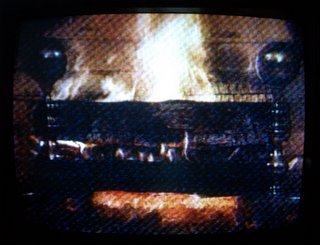 The Yule Log on my TV on Christmas day
The Yule Log on my TV on Christmas day
Ramin Talaie
From my apartment in Brooklyn, New York.
Sunday, December 18, 2005
Ethics
 Hossein Fatemi/FARS News Agency - Syndicated for free in Iran
Hossein Fatemi/FARS News Agency - Syndicated for free in IranFact
All of the above photos are essentially one image. However, there are 3 different names attached to it.
Questions
Who is the real photographer? Was this image stolen? Is this a common practice among Iranian press?
The Real Story
The image captures the pandemonium, rescue and the tragedy of a C-130 plane that crashed into a residential tower.
Reuters reported that over 116 people died in the crash. Among the dead were 68 journalists and media technicians, en route to cover military exercises in the Gulf from various news agencies
I feel that the tragic loss of friends and colleagues is over shadowed by the lack of ethics shown by the Iranian press/photo community.
Fars News Agency, like other government sponsored news gathering organizations in
Photographers who work for these news agencies (i.e.
Their photographers get paid a salary and the images are owned by the news organizations for distribution. The publications in
Some photographers hungry for worldwide recognition and a quick dollar sell the exact images to various stock and news agencies outside Iran.
Polaris in
One principal offender, Majid, who is a senior shooter with
Majid also sells to Getty Images which supposed to be distributing exclusive pictures through their wire services.
I am not sure how to address this problem. One photographer blogger in
The annual international book fair in
document IRAN/Ramin Talaie -
WTO membership might be years away, but the way I see it, ethics among journalists should rise above it all.
This is a challenge for all Iranian journalists to understand and to face it head on...now.
Ramin
Brooklyn
Friday, December 16, 2005
Transit Strike
Subway entrance across from Grand Central Terminal - 8:30 pm
At
Ramin Talaie
New York, New York
Wednesday, December 14, 2005
Greenspan at NYU
Wednesday, December 07, 2005
Tuesday, November 29, 2005
I simply love this!

Ramin Talaie
Brooklyn, NY
Monday, November 28, 2005
Starbucks?
It shows:
1. there are no copyright laws in Iran.
2. power of image marketing.
 See here for the full story in Farsi.
See here for the full story in Farsi.Ramin Talaie
Brooklyn, NY
Sunday, November 27, 2005
Lou is shot!
Tuesday, August 30, 2005
Reuters soundman shot dead in Baghdad by US forces
A Reuters Television soundman was shot dead in
A
Click here for the full story.
Ramin Talaie
NYC not Baghdad
New Fulton
Ramin Talaie
Lower Manhattan in New York City
Tuesday, August 23, 2005
In a Sean Penn movie!
It has been months since my visit to
In this movie you can see me smack in the middle of the pack, mixing and pushing with the Iranian photographers for a Sean Penn’s picture.
I wrote a correspondence piece on his visit for The New York Sun.
Ramin Talaie
@ Home in
Saturday, August 20, 2005
Nothing Really
However, here is the Times article on Judge Crater.
Ramin Talaie
New York City
Friday, August 19, 2005
Judge Joseph F. Crater
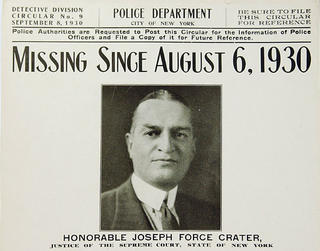
Judge Joseph Force Crater was reported missing on
Today, The New York Times asked me to go to a New York Police Department facility on cold cases in
Evidently after all these years, there have been some developments. So pick up a copy of the paper in the morning to find out about this 75-years-old case…..I know I will!
There is also a book published on this case called “Vanishing Point”, by Kenneth D. Ackerman (Ivan R. Dee, Publisher - 2004).
Ramin Talaie
Brooklyn, New York
Thursday, August 18, 2005
Of Rats and Labor
Evidently Wiener, the Congressman and
On a slow news day this is news.
Ramin Talaie
Wednesday, August 17, 2005
Flash

A heavy set man in a cheap suite who was either an owner or a manager announced that "bunch" of Scores dancer will come down and pose for pictures soon.
As far as I could tell, the announcement for the new club was already out there and there was no need for the girls. But I guess we needed to get some silicone to go along with the text.
Of course the paparazzi were out in force. A hand-full of sleezy looking guys with point and shoot cameras also waited to snaps shots of the dancers.
New York Post and Daily News photographers posed the dancers as other guys made similar requests. They would say “honey” could you turn this way or “sweetheart” look over your shoulder.
As I tried to make some feature images out of this over-set-up event, I ran into Lauren my reporter from the The New York Sun. We both looked at each other and gestured what the hell we are doing here. She then turned and said “weren’t you in
Tuesday, August 16, 2005
File this under nothing
I shot this image as I covered the mayoral debate of all Democratic candidates at Jazz at
Monday, August 15, 2005
Farewell to Steven Vincent
Vincent's wife, Lisa Ramaci, kisses her husband one last time
Steven Vincent was killed in
Vincent authored "In The Red Zone" and recently had written an Op-Ed piece for The New York Times.
Blogger and Time magazine reporter Christopher Allbritton wrote this piece after his death for the New York Magazine.
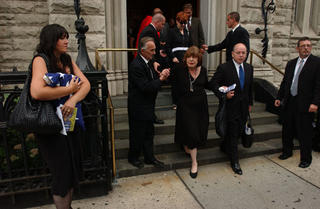 Vincent's wife, Lisa Ramaci (left), holding to a folded American flag stands outside the church after his funeral
Vincent's wife, Lisa Ramaci (left), holding to a folded American flag stands outside the church after his funeralFriday, August 12, 2005
Fill her up
A number of production stoppage and geo-political worries in
Not helping the situation is
At the pumps gas prices will probably reach higher than their current average of $3 by early next week before falling back to a reasonable level.
In the meantime Americans will continue to drive bigger cars, ignore the
Ramin Talaie
Thursday, August 11, 2005
Times Square Iconic Kiss
As the
The iconic image was captured by Life magazine photographer Alfred Eisenstaedt.
Today, Edith Shain, the 86 year old woman who claims to be that young nurse posed with a statue of the photograph which will be placed in
Ramin Talaie
New York City
Tuesday, August 09, 2005
Anti War Protest
Syrian born artist, Hala Faisal, protested the war in
With anti-war slogans written in both English and Arabic in red paint on her bare skin, she stepped into the
Tourists and local New Yorkers inaudibly looked on while a few people applauded for her.
After circling inside the fountain three or four times Faisal was arrested by the New York City Police.
Two men shouted “stop police state” as she was lead to a patrol car and taken away.
Ramin Talaie
New York City
Monday, August 08, 2005
A new photojournalist?

Ramin Talaie
Brooklyn, New York
Smoking Kills
Peter Jennings Dies at 67
He will be missed...
Get informed
160,00 people will die of lung cancer this year.
Lung Cancer Foundation
http://www.lungcanceronline.org/
http://www.lungusa.org
More on Google about lung cancer
Learn about the truth on smoking:
www.thetruth.com
This blog posting is not brought to you by any tobacco companies, but
Sunday, August 07, 2005
God Speed Discovery
In the next few hours the space shuttle Discovery will start its return to earth. As I go to sleep, my thoughts and prayers are with the crew.
Ramin Talaie
Brooklyn, New York
Thursday, August 04, 2005
Correction on ....
Journalists in War Zone
Iraq
The Balkans: 49 journalists killed between 1991 and 1995 during the war in the former
From Christian Science Monitor
Source: Reporters without Borders, Committee to Protect Journalists, International Press Institute
Wednesday, August 03, 2005
Over 40 Journalists Have Been Killed in Iraq
From todays New York Times on the killing of Steve Vincent:
American Journalist Is Shot to Death in Iraq
Also from AP on his killing:
U.S. Journalist Shot to Death in Iraq
Here is Vincent's Op-Ed piece he wrote for NY Times.
Steven Vincent's Blog
To learn about Iraq casulaties check here:
icasualties.org
Wednesday, June 08, 2005
Propaganda
Watching news on TV in Iran one has to constantly interpret every word or directly reverse the editorial pint of view to get the actual news.
All TV and Radio in Iran is directly controlled by the government. There are many American and European movies dubbed in Farsi and shown on TV. But when it comes to actual news, it is pretty much all propaganda.
There is one channel called Khabar, which means news and has news shows in Arabic, English and Farsi.
From time to time, I catch the English edition anchored by various men and women with American or British accents. You get a feel of watching SkyNews or CNN in London. The only difference is the content and the way they look.
Women are of course in full Hejab, Islamic covering showing only the face, and men never wear a tie and sometimes are unshaven.
Yesterday there was a news piece about Palestinian/Israeli conflict. Of course they call Israel the Zionist Regime. The anchor reading the news was trying so hard to make the news one sided. He actually said, “pellet throwing Palestinian youth…” to even lessen the size of the rocks being tossed.
In another piece about the desecration of Quran, the Islam’s Holy book, in GITMO, they showed a different American prison. It was not Cuba and the prisoners were not suspected Muslim terrorists!
It was the video was of a black man being executed by lethal ejection. I guess they wanted to show something gruesome in America. I must say that the video looked very dated too.
There is no real attention to truth either. The uglier the better.
News about Iraq always starts with “the American occupiers…” and if there is a video, I am sure I have already seen it many time last week!
Don't get me wrong, Americans are occupying Iraq and we all feel for the Palestinian struggle, but the news has to be reported as seen, not as what they want you to see.
Ramin Talaie – Tehran, Iran – June 8, 2005
Thursday, June 02, 2005
Where is the American?
Qom is the center of Islamic theological movement in Iran. It’s the hub of all Islamic activities and where the revolution sets its roots.
I had coordinated my trip with Ershad, Iran’s Ministry of Information and Islamic Guidance. The ministry controls all foreign and domestic media and where we could go.
We got on our way around 7 am after settling on a fare of 6,000 Tommans (about $7) per person. We headed to south of Tehran passing Imam Khomeini’s golden dome with its four minarets.
The guys played Persian music and I put on my iPod. Driving like a mad man on a 3 lane highway in a KIA made Pride, we made it to Qom under 1 ½ hours.
Once inside the city, we headed right to the Huzie-e-Elmeh, the theological school. After checking with the young soldier at the gate I went looking to find a man who was in charge of media relations.
Thirty minutes later the man drives in through the front gate. I approached him and introducing myself saying salam and shaking his hand. I showed him my credentials from Ershad and asked him to let us photograph the place.
He read the letter and swiftly refused us. His reason was that I was representing an American firm.
I tried reasoning with him and the fact that the letter came from highest authorities in Ershad. The man just smiled and said it’s not in my hand.
I pressed on looking right at him and asked him who else I can talk to; after all I had coordinated everything from Tehran. With the same smog, he mumbled “there is no name we just don’t let Americans here....” or something to that fact.
He held on to the original letter and would not give it back to me. I had a feeling that he was nobody and perhaps was of afraid of Ershad. I insisted on getting a copy of the letter before returning to Tehran.
Disappointed and ticked off, we walked out and joked with the guard at the gate. I told him they don’t let us in because I am an American. His eyes opened wide and said, “say hello to all Americans.” I smiled and looked at his sincere response while shaking his hand. He continued “we…” perhaps referring to his friends or family “…are in favor of America.”
Three of us, Mohammed, Hussein and I made our way through a vast yard towards the center of the town looking for something to photograph.
Don’t let these authentic Muslim names fool you, Mohammad and Hussein were a riot making fun of the mullah’s as they walk passed us.
Mohammad kept saying, please agah (mister in Farsi), I beseech you to keep us in your prayers! And Hussein who looked very much like the locals with his thick black beard would say "hi" in English.
We spent a few hours walking up and down the streets taking pictures and having fun. The sun was brutal and we were thirsty so we were slowly retreating back to the car.
Mohammad found a bank and wanted to get some money. We followed him as Hussein took pictures of me avoiding the sun and Mohammad counting his cash.
We called our driver, Hussein’s brother in-law, and asked him to meet us near the bank. Mohammad noticed a campaign center across the street for Hashimi, the leading presidential candidate, and dashed into the building for a few last photos.
We crossed the street too to see what else was there. Hussein started taking pictures of some signs outside and I went in looking for Mohammad.
As I walked up the stairs, I noticed he was arguing with a guy to get his press ID back. The same man then shook my hand and asked me to follow him.
Thinking he was a campaign worker, I had no intention of following him for a lecture. However, I noticed that he has actually grabbing Mohammad’s hand. Then I become aware of what we were dealing with.
There were two bearded men in typical Basiji outfits, long sleeve shirts and trousers. They detained us and insisted on following them.
This was not good, I thought to myself, but we followed them. So far they had left me alone as they tussled with Mohammad. We followed them to the corner turning into an alleyway.
This was serious, thoughts rushing through my head. My papers were all legit and Mohammad and Hussein were locals, so let’s stay cool and see what happens.
With polite yet unpleasant faces they insisted that they were doing their job and needed to “talk” to us as we kept asking what’s going on. Mohammad kept demanding to know exactly what he had done wrong.
One of them men asked us why we were taking pictures. I told him, we are journalists and had a permit to take pictures of campaign posters. I told him we have a letter from Ershad and reached into my backpack to fish it out for him. I made sure to bring out a copy and not the original.
He read it and looked at me and looked and Hussein who was not saying anything. Perhaps Hussein was thinking, shit, Ramin’s American ID will get us in trouble.
The other guy asked if we had taken pictures of the bank. We knew then, that they had been tailing us. We all said yes…we took pictures of ourselves, not the bank. Asking what is wrong with that?
The head guy called for authorities to arrive on his cell phone. I heard him saying “…one of them is an American” to make the matter more urgent, but he has a letter. He was making calls on his phone and providing our locations on his walkie-talkie.
His phone ringer, Hussein Hussein, a chant that is done by beating one’s chest during Ashura confirmed to us his fanaticism. I was getting real nervous, but kept calm.
His partner went to get the street name for direction; taking advantage of his absence I switched my memory cards in my camera. Something I have done on instinct in the past to protect or hide my work. I also felt a little relief for not taking my iPod with me and hiding it in the trunk of the car. After all this was Qom.
I had just finished reading the book, “Blinded by the Sunlight”, the story of Newsday’s reporter and photographer who were captured by Saddam’s Mokhaberat and kept in Abu Gharib prison for 8 days during the American onslaught on Baghdad.
Some of McAllester’s thoughts, the reporter who wrote the book, and experiences became real in my mind as I stood there in the mid-day sun, taking inventory of my belongings in my backpack and assessing the situation.
I made a jester to move to the shady side of the alley as I checked for guns under their shirts. I thought may be we could make a run for it.
Another call comes in to his walkie-talkie and I ask…can we go now? He had our cards and my paper. Mohammad continued with his inquiry about our detention.
I thought to myself, I am too tired to go to jail. Thinking may be a car is on its way to take us to Etelaat (Iran’s version of Mokhaberat) or a committee where Basiji’s gather.
I was about to have a major dehydration if I didn’t get some liquid in me soon. I probably would sleep on the floor of the jail and write a book about it like McAllester. All I wanted to was to walk away with our cards in our hands.
I noticed a solider searching for the alley…then another one. They didn’t say anything as the approached and stayed behind us.
Finally a man in a lime green police uniform followed them. He had a walkie-talkie too.
He walked up to us and said, where is the American? That got our attention and set a slight tension among us. Mohammad was suddenly silenced as I said that’s my card. Trying not to say that I am “the” American!
I told him, I work for a foreign press agency avoiding saying the word “America.” He then asked, but you are from there? I replied… I am an Iranian. He asked again, but you reside in America? Finally cornered and not wanting to lie, I said yes and said nothing else.
The Basiji men looking at the officer appeared to have a pleased frown on their faces. I had admitted to my guilt of living in America. They had their spy talking picture and were perhaps receiving a reward if not more virgins in the next world.
The officer inspected my letter and asked if I have the original? I said yes as I pointed out to him that it was signed and stamped at Ershad.
Quickly he called into his walkie-talkie informing his base that the “American” was in fact legit and there was no laws being broken. The three of us took a deep breath. He motioned to Basiji men and shook our hands walking away with the soldiers.
The Basijis wanted a copy of the letter. I told them to go make a copy not wanting to give them any satisfaction.
30 minutes later we walked out of the alley looking for our driver who was wondering about us. We were pissed off but joked about the incident and drove away wildly passing the mullahs on motorcycles.
Perhaps in a show of defiance, the guys blasted the stereo playing Sting’s “Desert Rose.” Passing Qom’s dried up salt lake I was very happy to walk away and thinking to myself, I will never come back to this city again.
Ramin Talaie – Qom, Tehran – June 1, 2005
Friday, May 27, 2005
Tehran Stock Exchange
Walking into Tehran Stock Exchange, the Bourse as it is known, I get the feeling this place is very different from NYSE or AMEX.
The building sits on a major north-south street in a busy section of Tehran. There is no evidence of any security which I am used to see both here and in New York.
Men with funny Farsi accents, from small cities in central Iran, sell a variety of business dailies right outside.
The doors are wide open but the entrance is crammed with men just standing there. As you walk in the stench of body odor hits you in the face and welcomes you to a packed room of men and a handful of women.
Everyone standing tightly, almost touching each other, and staring at a series flat-screen monitors for the latest updates on a wall. At the end of the entrance hall a few computers kiosks provides on-line information.
On far left, a guard in forest green uniform, one of the many of Iranian military outfits, stands by an unpretentious door which provides entry to the actual trading room.
Upstairs a glass rotunda provides a bird’s eye view of the trading floor and a big board which posts the latest changes and top movers. There are seats around the U shaped glass area but all are taken and much like downstairs the place is overcrowded.
Men sitting around debating and watching the changes as if they are at a soccer match as they play with their tasbeh, prayer beads, with one hand.
The place has a feel of an Off Track Betting location than a sophisticated stock exchange. I see a few men squatting in a corner reading their papers, and one guy fervently talking on his mobile phone with tension.
Shady middle aged Iranian men, unshaven and wearing buttoned up shirts with no tie huddle in small groups. Perhaps sharing the latest on a jockey or wheatear their horse runs well in the mud....um!?
There is no sense of urgency here. No sell sell sell, or men signaling for buyers. All the trading is done on the floor. Administrators, who sit behind computers, take calls and place orders inside the trading room.
I get the feeling some people are just here to watch their stock or may be the exchange.
After I take my pictures I swam my way back through the sea of people. Through my struggle with my heavy backpack, I hear “take my picture mister”. Younger men realizing that I am a reporter and perhaps a foreigner, practicing their latest international communiqué.
I smile and node and continue to push through. In this polite society you don’t need to say ‘excuse me’ or ‘I am sorry’ as you bang your way out.
Stepping outside and into Tehran’s heat, I now have to deal with midday traffic but I don’t miss the body odor and the constant touching.
Ramin Talaie – Tehran, Iran - May 25, 2005
Monday, May 16, 2005
Presidential Elections - Over 1,000 Iranians Bid for the Office
Scores of Iranians encouraged by family and friends turned up to the Interior Ministry seeking a bid to run for the 9th presidential election of the Islamic Republic of Iran. Most seemed to have walked off the street while many had found an opportunity to make a point. Only a few appear to have a legitimate claim and a chance for the office.
Over 1,000 Iranians registered as candidates for the presidency in the upcoming June 17 election. The list of applicants significantly higher than 4 years ago, up from 814, will be submitted to the Guardian Council for approval. Last term about 10 of those 814 were approved; officials at the ministry expect the same result this year.
Iran’s Interior Ministry’s building, a government tower with a helipad on its rooftop erected distance away from the street, was the filing center for this very first step in the Islamic Republic presidential election.
A spokesperson for the ministry, overwhelmed by the number of hopeful applicants, during this five-day period explained “the problem is that there is no age, education or even experience requirements”. Filing an application is open to every Iranians. The very first step seems to merely requiring applicants to know how to read and write.
Among the more powerful claimants for the position, front runner and former president Ali-Akbar Hashemi Rafsanjani showed up on the second day to sign up. Other politicians such mayor of Tehran, former chief of police, and various members of Majlis (parliament) paraded daily to file the necessary paperwork.
A young revolutionary teenager, Mohammad-Ali Delgardi, 19, sporting a jet black beard and rosy cheeks from a town in central Iran, said he was simply doing his religious duty by filing an application. When asked about his chances of becoming a presidential nominee, he left it up to God’s will.
Another applicant, a 60 year old woman, Kobra Ashori, seemed to be there of out retribution. Ashori, currently unemployed, but with years of experience in various industries, thinks of herself qualified and as someone who will stand up for women’s rights.
She justified her lack of political experience by saying “for close to 30 years these people with no understanding of government ran this country” referring to the leaders of the Islamic Republic, “I am sure I can do a better job than them.”
Ashori proclaimed, “We need a female president to look after our rights,” raising her voice slightly for others to hear, “I would proudly vote for a woman in this coming election”.
Majid Hashimi, 70, a silver haired retired man with a gentle grandfather demeanor thinks friends and family’s backing will win him the job. Hashimi says he has no money to run his campaign, nor did he have a clear platform, but was banking on those who love him and have encouraged him to run.
Shrugging off a reporter’s question, a young woman in her early 20’s, replied “I came here to file an application since I had nothing else to do” during an interview with the state-run TV, suggesting frustration of her generation’s lack of opportunity.
At another table a woman clad in a black chador and hejab (Islamic covering) reviewed her application before handing it in. 34 year old, Fatima Kianpour, a professor at Tehran University teaching management theory, seemed to be the most qualified applicant in this field of merchants, clergymen, bakers, unemployed, housewives, retired, students, and a male singer.
The record breaking 1,010 candidates includes 89 women, perhaps a small sign of progression and push by Iranian women for more freedom. The youngest candidate is a 16 year old boy, a legal age in the Islamic Republic of Iran, while the oldest is an 86 year old man.
On May 25, the Guardian Council will publish its approved list of candidates. Disqualifying the masses among those politically charged individuals and moderates, including those who may seek closer ties with the US.
A spokesperson for the council has already announced that the current process will be examined and revamped by the next election. Making a suggesting to change the application process to be more fitting for the office of the presidency. However, the Guardian Council will continue to be the ultimate voice in selecting those individuals who should run.
Ramin Talaie – Tehran, Iran
Wednesday, May 11, 2005
I am Here
Eight hours earlier a young Iranian girl was sporting a wife-beater and low-riser jeans while parading her midsection in the Munich Airport. As we prepare to land in Tehran she is now covered in appropriate Islamic attire. She has a black scarf covering her hair and a tall tight fitting leather jacket down to her knees. Eight hours ago she was reading a book and smiling. Now she is silent with a blank stare.
A middle-aged Iranian woman in front of me was chatting with a German lady in broken English during the flight. As she gets up to leave she adjusts her head scarf concealing her hair. In Farsi she talks to a friend in a row behind me “why don’t men wear their hejab (Islamic covering)?” mocking the whole process as she fixes her scarf. Then she translates her conversation to her new German friend who is also wearing a hejab now. She explains, “men don’t have to wear this” pointing to her head, “they can wear short sleeves shirt and do what they want”, they both laugh. Carrying on the conversation she says,” I guess they are the boss” as they both laugh again like teenage girls sharing a secret. A few seconds later, the Iranian woman continues, “but inside the house we do what we want and we are the boss”, they burst into laughter again. She fixes her scarf once more which barley covers up to the middle of her head. With a frustrated gaze looking at her friend behind me and loud enough for others to hear, she says “this is Islam” in annoyance.
We have just landed in Tehran, the capital of the Islamic Republic of Iran. In less than ten minutes someone has already voiced her disapproval of Hejab. Scores of international flights are arriving bringing with them the privileged and well connected Iranians along with Asian and European businessmen. As we leave the plane we are reminded that there are no photography is allowed at the airport.
Tehran Mehrabad International Airport is a mess. There is no way to describe its inadequacies with regard to international standards and safety issues. The airport sits dangerously in the middle of this ever expanding city. The airport used to be on the outskirt of Tehran. However, years of poor city planning and neglect has allowed homes to be built all around the airport property. The new airport, Khomeini International, which was completed last year, is still not operational. The Revolutionary Guards took control of the airport and closed it down, once they learned that Euro-Turkish contractors were in charge of safety and flight security.
After the passport control and picking up my luggage, I make my way to the sea of people on the other side of the glass in the waiting room. It is amazing how many people are here. A large group bursts into cheers and push forward at the same time. They must have noticed their loved one making his way out. I feel like a fish swimming against the current. There must be 10 to 15 visitors for each traveler.
I finally step out of the terminal and take a big gulp the polluted Tehran air. As I look around for a taxi, a few gypsy-cap drivers rush up to me offering their services. After negotiating with a driver for a fair price we get on our way. Bargaining is a must her in Iran. I haggled him from his 5,000 Tomans asking price to 3,500. It is late and I am tired, but if you don’t haggle here, you get screwed.
It is 38 minutes before midnight and Tehran is alive as Times Square. There are no fancy neon lights or scores of tourists snapping pictures of each other. There are just men and cars. We circle the Azadi square in my driver’s white Kia. He suddenly starts chatting with me to which I node and look directly into the back of the cars in front of us. He says “there was a time when people used to go out and have fun agha (Farsi for mister)”. Not sure what his point was, I say nothing and nod to be polite. He continues “now people are out doing nothing.” I am still not sure what he is trying to say. The traffic is heavy and swarms of men, young and old are at every corner and turn. Perhaps women are camouflaged with their black chadors (a long black sheet covering head to toe) in the dark. The driver sighs out load “eey Khoda” beseeching God. Still, I don’t say anything, but he continues. “Now agha people go out because they don’t have nothing to do.”
Not even an hour into my journey in Iran and I have witnessed a woman’s objection for wearing hejab, and a taxi driver’s rant about the socio-economic issues of Iran. I have arrived, I am here, and this is Iran.
Ramin Talaie - Tehran, Iran
Wednesday, February 09, 2005
3 Dollar Haircut
When it was my turn for a cut, I made sure to repeatedly say "no military cut." I pointed to what seemed to be an Army issued photo of soldier next to the mirror and said "NO!" The barber just smiled and said “okay sir”. I got into the seat thinking I would walk away looking like a soldier!
As I said, he was finished 3 minutes later. I was just getting comfortable in my seat when he said “thank you sir.” He then walked around with a mirror and proudly showed his work for me to inspect. I nodded in satisfaction and again he smiled back. I looked at him, bright white teeth shining on his dark oily skin. As I got up to leave, I inspected the haircut once again. I was quite happy with my decision to get the cut.
I tipped him one dollar and wondered why the same $3 haircut costs $30 in New York City!?
Ramin Talaie – Camp Liberty – Baghdad Iraq
Tuesday, February 08, 2005
Marines Can’t Find Me
It has been exactly 9 days since I started asking the United States Army to transfer me to Ramadi and 2 days since I actually got in touch with the Marines there. After initial contact, the Marines immediately responded with an email asking for some information; one of which was a bit concerning and could be the reason why I'm still here.
The Marine Officer, a 1st Lieutenant, asked me where Camp Liberty is. I had a number of responses in my head, none of which would have been appropriate. I did not want to burn any bridges, but at the same time wanted to make a point. I wrote something like the following as my answer to his question “….since I do not have any clearance to be shown classified information, I have never been pointed to the base on a map. However, I know it is next to Baghdad Airport …. I can see the planes land….and it’s huge.”
It is very disappointing to hear a Marine Officer in charge of Public Affairs asking such questions. It’s not like he's one these weekend warriors National Army Guards who are truck drivers, teachers, and cops back home. He is a Marine and the Marines are always Marines. Even if he is a Reservist, that’s no excuse for a Marine! It’s like me asking photography questions to them.
I feel that I am playing with my luck, letting them to see if he can find the base and then, find a way to get me out there. As soon as I land in Ramadi, I have to start my request for the next location. I feel totally incarcerated being embedded.
Ramin Talaie – Camp Victory (shush…don’t tell the Marines) – Baghdad Iraq
Sunday, February 06, 2005
Embed
Yesterday, a female Italian journalist was abducted in daylight about 300 meters from the hotel in which I was planning to stay. A reporter friend, who had suggested the place, has placed himself in lockdown. Every time something like this happens, the reporters here try to figure out the pattern and keep a low bunkered down profile. The location where this reporter was taken is probably a very safe area, according to everyone here. It’s so hard to guess today’s Baghdad. So, since I feel that I'm against the wall with only the embedding option, I've been trying to work things out and move on from this base.
As for me and this situation….I am amazed at the level of incompetence of some people. Unfortunately for me, a few of such people were in charge of my embed process at Camp Liberty. I can go on with the details of how stupid some of these people are. These same people are authorized by our government to carry M16s. But the military is like any other corporation - with more than its share of such people.
I have resigned myself to the fact that for now and for the remainder of this trip, I will go against everything in me as a journalist and an independent person and stay with the embedding process. I would not recommend embedding with any units unless they are seeing action, such as the Marines during the Fallujah offensive. I could write a book on how and why not to embed. It's just not natural for a journalist to do so.
I'm hoping that the Marines will be more involved with everything that the National Guard folks are. Perhaps it will be more fruitful.
Ramin Talaie – Camp Liberty – Baghdad, Iraq
Friday, February 04, 2005
Why am I here?
The unit conducts daily missions with Bradleys and tanks. This is an area known for what the Army calls Improvised Explosive Device (IED) and rockets. You can hear them from the base and, if you are lucky enough, you can feel it and not actually get hit with one. On a normal mission, their tanks drive on some of the most dangerous roads here. In terms of safety measures against IEDs, they hardly take anything less than a Bradley . Just yesterday, an IED hit a tank. The tank commander told me it looked like they used three rounds instead of the usual one or two. However, the tank only took minor damages and was able to roll back to the base for repairs.
During the several raids and patrol missions that I participated in with Louisiana National Guards First Battalion, I've had a lot of time to observe the soldiers and Iraqis. I've also asked myself why did I come here? Why am I doing this? Why do I think this is such a critical issue worth risking my life to get a glimpse of this madness?
I am afraid the reality of Abu Gharib abuses are not far from the reality of American imposed civil liberties on Iraqis. Simply, the standards are not the same as in America. One can say this is war and soldiers with guns are targets and can take no chances. Perhaps we can argue differences in cultural issues to justify the discrepancies.
I went along on a mission that was supposed to be a search and destroy, if required. There were 10 to 12 soldiers on foot followed by two Bradley Fighting Vehicles and I. Shortly after we started, one soldier yield out “the dude over the roof….as soon as he saw us he ducked and went inside…he had on a black top”. He was pointing to one of the few two story houses on the block. We circled the house in formation looking for a man in a black shirt. Almost all the neighbors are now outside standing by their front doors. Bradleys shake the ground and are as loud as a tractor, so everyone knew Americans were in the area. As I got myself to the front door of the house, I could see a few guys doing the same things as the other neighbors; standing there looking at us. Then the soldiers grabbed two guys in black shirts and another young guy who was getting a cigarette from one of the two suspects. They were all stopped and pushed against a wall. The young Iraqi man, with piercing green eyes who was getting a smoke, looked really upset and bewildered. Before they knew it, they were being detained. A sargent approached them, pushed them against the wall and made them hold up the palms of their hands. Another solider grabbed a kit from the back of the Bradley called ‘EXPRAY’. EXPRAY is a field explosive detection test. It uses swipes from hands to determine contact with explosive agents and changes color after applying a special spray. If someone touches any kind of IED, the test would be positive. The sargent began taking swipes from each of their hands. That young Iraqi man remained somewhat vocal and seemed to be asking why he was being subjected to this. He kept saying something in Arabic with the word "motarrjem” which mean translator. Maybe he was asking for a translator to explain the situation or his rights? He was certainly not happy. The soldiers simply assumed all three men were guilty until they were proven innocent. This would never fly in the streets of any city in America. Why are the civil liberties that we respect and cherish as part of the great American democracy are not applied here? Aren’t we trying to make all Iraqis like the United States and bring our style of freedom to them? Maybe I am completely off base here, but the events of Abu Gharib prison were allowed to go on because Iraqi prisoners were assumed guilty; that they were hiding some valuable intelligence or were insurgents. Therefore, torture and physical humiliation became a way of obtaining information. The EXPRAY test came out negative and all three were let go. One of them nervously smiled and smelled his hands to try and figure out what had just taken place. The upset young Iraqi continued speaking louder as he lit up his cigarette and walked across the narrow street to his worried wife.
Most soldiers that I've gone outside the base with have told me that they've not met an Iraqi that they liked. “All we see are these people in Abu Gharib that make IEDs to blow us up” said one officer to me.
A few minutes after that incident, one solider pointed to a house with barbed wire. Barbed wire is common in this poor neighborhood. It’s often a good security system for thieves who can easily jump the low walls. Again, we circled the house in formation as one of the soldiers banged on the door flat-handed, yelling in English “American soldiers! Open the door now!” The man of the house rushed to the door without his standard Iraqi sandals and opened the door. His eyes opened wide at the sight of American soldiers with their guns trained on him. With a worried yet respectful gesture, he pointed to the inside of house to let soldiers in. The Iraqi man had no idea what we were saying, nor did we speak proper Arabic to communicate the reason for searching his house. As I followed the soldiers, I tried cleaning my boots of as much mud as possible before stepping inside the house. His wife, who standing in the middle of the first room holding her daughters like a bird close to herself, looked at me. I said "asalaamu alaikum" and put my hand over my heart, a common Middle Eastern gesture for greetings. She said “walaikum asalaam" and looked down. Perhaps she thought I was an Iraqi man and did not want to make eye contact. The soldiers tracked mud all over the house, looking for anything they thought was suspicious. As many poor Iraqi homes I have been to during these daily raids and searches, they all have the same familiar stuff. The first room consists of a bunch of blankets, foam mattresses, and hard-cotton pillows neatly stacked on one side of the room covered with a decorative bedspread. The room may or may not have a TV. Another room, reserved for guests, has sofas or seating cushions, depending on the family’s income or status. A kitchen could be a corner of a hallway or small open square with dirty dishes and teacups on the ground. Of course, there is a fully loaded Kalashnikov tucked away in the only cabinet in the house. On a raid, the weapon would be taken away as evidence and would result in tearing down every inch of the house to look for more. On a search or patrol mission, it was accepted as a normal necessity of an Iraqi man with a family. We did not take his Kalashnikov away which made him at ease. Back in good ol' America, people have the right to refuse an entry unless the officers have a court order. Here the same rules do not apply. Maybe because the insurgents do not follow the rules of war by stepping up and fighting the American soldiers head on? Or perhaps they have not been given a copy of the Geneva Convention? They have taken to hostage-taking of Iraqi and non-Iraqi nationals, suicide bombings, and setting up explosives by roadsides, aimed at any military convoy.
When do we start treating people the way we want to be treated? How can we champion freedom and democracy around the world when we allow anything but that to go on anywhere else? Of course, young Iraqi men run when they see a tank and a dozen soldiers in their backyards. Maybe it’s the same reason young black men run from cops in the ghettos of New York City? Maybe they do not have anything to hide, but are conditioned to do so; conceivably conditioned by presumption of guilt by the authorities. They all look suspicious if we all look closely. It’s the fear in which they live in. They fear both the terrorists and American military. On election day, Abu Gharib was far removed from the reality of Baghdad’s overwhelming support for the elections. A young man in his twenties, who was tending a small shack selling fruits and vegetables, asked us what was happening. He spoke broken English and seemed somewhat educated amongst the villagers. He said "people see you and run in fear. What are you looking for?" He told us that since the insurgency has gotten worse, he returned to Abu Gharib after leaving his school in Baghdad. I asked him whether he was voted or was going to vote? He said "no, nobody in this neighborhood is going to vote. They are all afraid of the terrorists." He seemed like a young man with a better future ahead of him. A future out of the slums of Abu Gharib, but stuck as a result of the current conditions. He was the first real victim I had come across all day.
Throughout that day, I could not help but to look at these people and try to figure out which one of them were the real terrorists. I tried to see which ones would not hesitate to rush a tank with an RPG. I wondered what’s it like to live under a foreign occupation after decades of wars, economic sanctions, and dictatorship. Then again, most of the Iraqis I have come in contact with do not see their misfortune as a result of Saddam’s dictatorship. That a question is now irrelevant. Saddam is gone and the conditions are as we see them. I had to come to see it with my own eyes and feel their fear first hand. I did not have to take any photographs; all I had to do was to listen and watch. I also wondered why the soldiers couldn't stop saying “hello” or “hi"!? I mean, they were being polite! Why couldn’t they learn to say "salaam" or "asalaamu alaikum"? I had to come here and see it instead of reading about it while sipping a tall coffee and reading the morning paper. Now, I am even more concerned and confused as to where this country is heading.
The privilege of this job is to see history first hand. However, it comes with the responsibility of being critical of what is right for all sides. I think about the documentary on James Natchwey about his life as a ‘war photographer,’ also the title of the film. I recall how he wanted to become a war photographer after witnessing that the images coming from Vietnam did not match the words of the US government on how the war was progressing. Then I recalled his friend Wes, the Reuters cameraman, saying “I don’t know why we do what we do!” meaning going to such places to document wars and conflicts. I guess journalists like myself, risking their life to tell a story, want to make sure that there is a record to the atrocities of war. Wars, just or unjust, are nothing but atrocities. It’s not like you take the bad guys to court, and by using evidence, prove his guilt. Then he gets sentenced to death by some sort of so-called humane punishment. No, war is not like that. You make the guilty call from bunkered-down war rooms in secret locations and bomb the bad guys. Smart bombs missing targets, civilian deaths, and false intelligence resulting in so-called lateral casualties are all atrocities too. Not to mention the fact that human flesh torn by two inch shrapnel is not humane at all, regardless of whether all wars are bad, even if you have to fight back. Without those pictures, no one could prove the abuse in Abu Gharib prison. The sword is never mightier than such photographs. The same photographs that came from Vietnam came from Kosovo. Without journalist in war zones alongside soldiers and victims, there are no checks and balances. The journalist covering the wars and conflicts is the only voice that the “other side” has. I'm not sure what I am doing here yet….I'm also not sure which is the other side. I'm just telling you what I see.
Ramin Talaie – Camp Liberty – Baghdad, Iraq.
